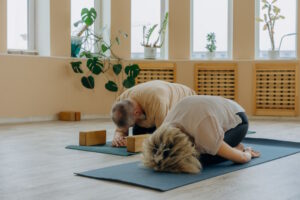
Selecting the right Pilates instructor is a crucial step in ensuring that seniors receive safe and effective guidance during their Pilates journey. As a foremost expert in Choosing the Right Pilates Instructor for Seniors, I understand the importance of finding an instructor who can cater to the unique needs and considerations of older individuals. In this comprehensive guide, I will address your questions and provide insights into what to look for in a Pilates instructor for seniors. Additionally, I will address the age-related concerns of whether a 70-year-old or a 65-year-old can do Pilates and explore the benefits of Pilates for senior citizens.
What should I look for in a Pilates instructor?
Choosing the right Pilates instructor for seniors involves considering several key factors:
1. Certification and Training: Ensure that the instructor is certified by a reputable Pilates organization, indicating they have received comprehensive training. Look for certifications such as PMA (Pilates Method Alliance) or Balanced Body.
2. Experience: Opt for an instructor with experience working with seniors. Teaching Pilates to older individuals requires a unique skill set, including patience, adaptability, and an understanding of age-related physical challenges.
3. Understanding of Health Conditions: The instructor should have knowledge of common health conditions affecting seniors, such as arthritis, osteoporosis, or joint issues. They should be able to provide modifications and exercises tailored to these conditions.
4. Clear Communication: Effective communication is crucial. The instructor should explain exercises clearly, provide feedback, and be attentive to your questions and concerns.
5. Empathy and Patience: A good instructor for seniors should be empathetic, patient, and compassionate. They should create a supportive and encouraging environment.
6. Safety First: Safety is paramount. The instructor should prioritize your safety, ensure proper alignment and form, and be vigilant about injury prevention.
7. Customized Programs: Look for an instructor who can tailor Pilates programs to your individual needs and goals. Seniors often have varying fitness levels and requirements.
8. References and Reviews: Check for references or read online reviews from other seniors who have worked with the instructor. Positive testimonials can provide valuable insights.
9. Trial Session: Consider scheduling a trial session to assess the instructor’s teaching style, compatibility, and whether they meet your expectations.
10. Location and Schedule: Choose an instructor whose location and class schedule align with your convenience and availability.
Can a 70-year-old do Pilates? Can a 65-year-old do Pilates?
Absolutely, both 70-year-olds and 65-year-olds can participate in Pilates, and it can be highly beneficial for them. Pilates is a low-impact form of exercise that can be adapted to accommodate various fitness levels and age groups. It is particularly suitable for older adults because it focuses on core strength, flexibility, balance, and posture, all of which are important for maintaining an active and independent lifestyle as we age.
However, it’s essential to recognize that the ability to do Pilates may vary from person to person. Some 70-year-olds and 65-year-olds may have different physical conditions and limitations. It is advisable for seniors to consult with a healthcare provider before starting any new exercise program, including Pilates, to ensure that it is safe based on their individual health status.
Working with a certified Pilates instructor who specializes in training seniors can make a significant difference in tailoring exercises to address age-related concerns and physical limitations. Pilates instructors can provide modifications and variations to ensure that seniors can safely participate and reap the numerous benefits of Pilates.
Are Pilates good for senior citizens?
Yes, Pilates is an excellent form of exercise for senior citizens. It offers numerous benefits that can enhance their physical and mental well-being:
1. Improved Core Strength: Pilates focuses on core strength, which is essential for maintaining stability, balance, and proper posture, all of which become increasingly important as we age.
2. Enhanced Flexibility: Pilates incorporates stretching and range of motion exercises that can improve joint flexibility and reduce stiffness.
3. Balance and Coordination: The controlled movements in Pilates can help seniors enhance their balance and coordination, reducing the risk of falls.
4. Mind-Body Connection: Pilates emphasizes mindfulness and concentration, which can improve mental acuity and cognitive function.
5. Low Impact: Pilates is gentle on the joints, making it an ideal choice for seniors, including those with arthritis or joint issues.
6. Stress Reduction: Pilates exercises can promote relaxation and reduce stress, benefiting both physical and mental health.
7. Pain Management: Many seniors experience chronic pain conditions. Pilates can help manage and alleviate pain by strengthening supporting muscles.
In summary, Pilates is an excellent choice for senior citizens, providing a range of physical and mental benefits. To maximize these benefits and ensure safety, seniors should seek out a certified Pilates instructor with experience working with older individuals. Pilates can be tailored to accommodate various fitness levels and age-related considerations, making it a valuable addition to a senior’s fitness routine.